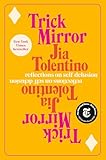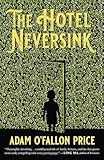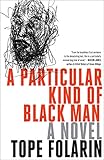Here’s a quick look at some notable books—new titles from the likes of Jia Tolentino, Sarah Valentine, Tope Folarin, Javier Marías, our own Adam O’Fallon Price, and more—that are publishing this week.
Want to learn more about upcoming titles? Then go read our most recent book preview. Want to help The Millions keep churning out great books coverage? Then sign up to be a member today.
Trick Mirror by Jia Tolentino
Here’s what Publishers Weekly had to say about Trick Mirror: “New Yorker contributor Tolentino debuts with a sharp, well-founded crackdown on the lies of self and culture in these nine original, incisive reflections on a hypercapitalist, internet-driven age that ‘positions personal identity as the center of the universe.’ While some essays peel back personal self-delusions—such as by recalling, in ‘Always Be Optimizing,’ how taking barre classes for fitness gave her the ‘satisfying but gross sense of having successfully conformed to a prototype’ —others comment on broader cultural movements with frightening accuracy, for instance noting in ‘Pure Heroines’ that ‘bravery and bitterness get so concentrated in literature, for women, because there’s not enough space for [women] in the real world,’ or that the election of Donald Trump represents the ‘incontrovertible, humiliating vindication of scamming as the quintessential American ethos.’ The collection’s chief strength is Tolentino’s voice: sly, dry, and admittedly complicit in an era where ‘the choice…is to be destroyed or to morally compromise ourselves in order to be functional.’ While the insights aren’t revelatory, the book’s candid self-awareness and well-formulated prose, and Tolentino’s ability to voice the bitterest truths—’Everything, not least the physical world itself, is overheating’—will gain Tolentino new fans and cement her reputation as an observer well worth listening to.”
The Hotel Neversink by Adam O’Fallon Price
Here’s what Publishers Weekly had to say about The Hotel Neversink: “Centered on a rambling hotel in the Catskills, the striking latest from Price (The Grand Tour) is part multigenerational saga, part murder mystery. In 1950, a young boy, Jonah, goes missing from the Hotel Neversink, and his disappearance kicks off a string of similar crimes that stretch across decades. The owners of the hotel, the Sikorsky family, avert scandal, until Jonah’s remains are discovered in the hotel’s basement in 1973. With no obvious suspects, the Sikorskys suffer the ups and downs of running a business associated with an unsolved murder, entertaining crime buffs and conspiracy theorists while the hotel—passed down from patriarch, Asher, to his daughter, Jeanie, and eventually to his grandson, Len—slowly loses its luster with vacationers, despite Len’s dedication to keeping the family business alive. Price focuses each chapter on a single character, which gives the work a novel-in-stories feel that periodically drifts from the hotel. As a result, the central mystery moves into the background, yet it never fully vanishes, wearing on characters without their acknowledgement as they face marital strain, addiction, and depression. Price is a sharp writer, and his novel wonderfully critiques family obligation while simultaneously delivering a crafty, sinister whodunit.”
When I Was White by Sarah Valentine
Here’s what Publishers Weekly had to say about When I Was White: “In this fervent and heartfelt memoir, Valentine, an artist-in-residence at Northwestern University, tells of coming-of-age in Pittsburgh, Pa., as the daughter of two white parents who refused to acknowledge an ethnicity hinted at by her appearance, and a family secret. Her mother and business consultant father were married in the 1970s when Valentine was born, and she describes an ordinary childhood in a loving family of Italian and Irish descent. Early on, she clues in that she is ‘different’ and even though her parents avoid the topic of race, others make note of her darker skin color (for instance, a school guidance counselor suggests she apply for a minority scholarship). Valentine attends Carnegie Mellon University, and at age 27 she presses her mother on the details of her past; her mother claims she was raped at a college party by an unknown black man (though her recollection is vague). The narrative moves fluidly between past and present as Valentine tries to make sense of the lies and misconceptions that have plagued her throughout her life. Beset with conflicting emotions and a sense of betrayal, Valentine begins a futile search to locate her biological father, and the revelation of Valentine’s conception (later confirmed by a DNA test that revealed 45% sub-Saharan African) will be simultaneously startling and yet expected to the reader. This is a disturbing and engrossing tale of deep family secrets.”
First Cosmic Velocity by Zach Powers
Here’s what Publishers Weekly had to say about First Cosmic Velocity: “Powers’s entertaining and winning debut novel about the 1960s space race launches from an intriguing premise: that the Soviet Union covered up fatal rocket misfires by recruiting groups of twins as cosmonauts—one to pilot the ill-fated space capsule, the other to bask in the glory of a faked hero’s return. Set primarily in Star City, Russia, in 1964, Powers’s story centers around the earthbound experiences of Nadya (whose twin burned up on re-entry years before) and Leonid (whose brother, the last twin, is currently orbiting the earth), through which Powers refracts glimpses of the competitive Soviet space program and its personnel, the sometimes absurd politics of the Khrushchev era, and the process by which a cold-hearted recruiter pried the twin Leonids away from their family in 1950s Ukraine. Powers (Gravity Changes) endows his stoical, driven characters with distinctive personalities and the capacity to reflect philosophically on their charade, as when Leonid says, ‘Maybe our individual personalities are just the areas in which we failed to copy someone else.’ Powers’s deadpan depiction of the ruse that drives his tale and the historical figures duped by it will give readers pause to wonder if it really is that improbable.”
A Particular Kind of Black Man by Tope Folarin
Here’s what Publishers Weekly had to say about A Particular Kind of Black Man: “Folarin’s tender, cunning debut begins as a realistic story of a boy coming of age in Utah in the 1980s, then slides into a subtle meditation on the unreliability of memory. Tunde, the older son of parents who emigrated from Nigeria, who is five years old when the novel opens, lives in a small town in Northern Utah where he is made to feel like an outsider. His hard-working father is frustrated because he can’t hold a job equal to his abilities, and his mentally ill mother frequently breaks down and physically abuses Tunde. When she leaves the family and returns home, Tunde’s father goes to Nigeria and brings back a ‘new mom,’ who has two children of her own whom she prefers to her stepchildren. After a move to Texas, the narrator is accepted by Morehouse College, where he realizes to his alarm that he is experiencing ‘double memories’ and is seeing ‘things I could have done as if I had done them,’ which causes him to re-write the version of the past by which the reader has come to know him. Only when he visits Nigeria does ‘reality click into place.’ Folarin pulls off the crafty trick of simultaneously bringing scenes to sharp life and undercutting their reliability, and evokes the complexities of life as a second-generation African-American in simple, vivid prose. Foralin’s debut is canny and electrifying.”
All the Water in the World by Karen Raney
Here’s what Publishers Weekly had to say about All the Water in the World: “Raney’s ardent debut examines love and loss through the eyes of Maddy, a vibrant 16-year-old girl diagnosed with cancer, and Eve, her loving mother. Maddy is spending the summer recovering from chemotherapy at her family’s lake house in Pennsylvania. While her thoughts often turn to normal adolescent concerns—such as her summer reading assignments and her crush—they are also studded with existential worries as she contemplates death, the existence of God, and the ephemerality of nature. Maddy begins to think about her father, who separated amicably from her mother before she was born, and decides she must get to know him before she dies. Over her final summer, Maddy and her father begin an epistolary friendship and bond over their mutual love of nature and advocacy for environmental protections. Reading the correspondence is painful for Eve when she later finds the letters. Eve, struggling to process everything, begins to spend long hours at the lake talking with her neighbor Norma. The book is broken into three sections, and is at its strongest when Maddy’s naive, searching voice narrates the story, which is effused with a passion for life and nature. However, the novel’s final section loses momentum, tapering off into Eve’s self-examination and excavation of the past. Raney’s pleasing tale is a deep, genuine investigation of memory, the pain of loss, and the strength of a mother’s love.”
Berta Isla by Javier Marías
Here’s what Publishers Weekly had to say about Berta Isla: “Marías (Thus Bad Begins) transforms a spy thriller into an eloquent depiction of those left behind at home in this rich novel. Popular, beautiful Berta Isla decides she will marry Tomás Nevinson, a half-Spanish, half-British classmate with a preternatural ability to learn languages, while they are students together in mid-1960s Madrid. During his studies at Oxford, Tomás is recruited by a professor to use his abilities with languages and accents to serve as an infiltrator for the British Secret Intelligence Service. He demurs, until he is accused of murdering his British lover and needs help evading the charge. Marías toggles to Berta as a narrator for Tomás’s return to Spain, their marriage in 1974, and his cover job for the British Embassy. Berta struggles to cope with her husband’s long, mysterious absences and forces a confession about his real job after a terrifying threat on their young son’s life. Tomás offers scant details of his work, which only partially satisfies Berta, who spars with him. When he leaves on assignment just before the start of the Falklands War in 1982, Berta’s worries compound as his time away stretches into months and then years. Marías switches back to a third-person narrator for the gut-punching conclusion that explains what happened to Tomás. The espionage premise is initially enticing, but the real draw is the depth of Marías’s characterization. This weighty novel rewards readers with the patience for its deliberate dissection of a marriage.”
Also on shelves: The Pretty One by Keah Brown and White Flights by Jess Row.
Image credit: Unsplash/Amador Loureiro.
The post Tuesday New Release Day: Starring Tolentino, Valentine, Folarin, Marías, Price, and More appeared first on The Millions.
from The Millions https://ift.tt/2M0h0Xn







Comments
Post a Comment